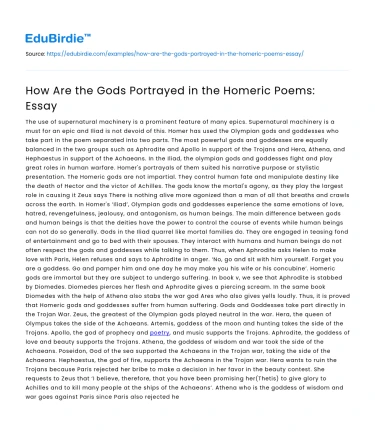The use of supernatural machinery is a prominent feature of many epics. Supernatural machinery is a must for an epic and Iliad is not devoid of this. Homer has used the Olympian gods and goddesses who take part in the poem separated into two parts. The most powerful gods and goddesses are equally balanced in the two groups such as Aphrodite and Apollo in support of the Trojans and Hera, Athena, and Hephaestus in support of the Achaeans.
In the Iliad, the olympian gods and goddesses fight and play great roles in human warfare. Homer's portrayals of them suited his narrative purpose or stylistic presentation. The Homeric gods are not impartial. They control human fate and manipulate destiny like the death of Hector and the victor of Achilles. The gods know the mortal's agony, as they play the largest role in causing it Zeus says There is nothing alive more agonized than a man of all that breaths and crawls across the earth.
In Homer's ‘Iliad’, Olympian gods and goddesses experience the same emotions of love, hatred, revengefulness, jealousy, and antagonism, as human beings. The main difference between gods and human beings is that the deities have the power to control the course of events while human beings can not do so generally. Gods in the Iliad quarrel like mortal families do. They are engaged in teasing fond of entertainment and go to bed with their spouses. They interact with humans and human beings do not often respect the gods and goddesses while talking to them. Thus, when Aphrodite asks Helen to make love with Paris, Helen refuses and says to Aphrodite in anger. ‘No, go and sit with him yourself. Forget you are a goddess. Go and pamper him and one day he may make you his wife or his concubine’. Homeric gods are immortal but they are subject to undergo suffering. In book v, we see that Aphrodite is stabbed by Diomedes. Diomedes pierces her flesh and Aphrodite gives a piercing scream. In the same book Diomedes with the help of Athena also stabs the war god Ares who also gives yells loudly. Thus, it is proved that Homeric gods and goddesses suffer from human suffering.
Gods and Goddesses take part directly in the Trojan War. Zeus, the greatest of the Olympian gods played neutral in the war. Hera, the queen of Olympus takes the side of the Achaeans. Artemis, goddess of the moon and hunting takes the side of the Trojans. Apollo, the god of prophecy and poetry, and music supports the Trojans. Aphrodite, the goddess of love and beauty supports the Trojans. Athena, the goddess of wisdom and war took the side of the Achaeans. Poseidon, God of the sea supported the Achaeans in the Trojan war, taking the side of the Achaeans. Hephaestus, the god of fire, supports the Achaeans in the Trojan war.
Hera wants to ruin the Trojans because Paris rejected her bribe to make a decision in her favor in the beauty contest. She requests to Zeus that ‘I believe, therefore, that you have been promising her(Thetis) to give glory to Achilles and to kill many people at the ships of the Achaeans’. Athena who is the goddess of wisdom and war goes against Paris since Paris also rejected her to declare the winner of the beauty contest. On the other hand, Aphrodite wishes to defend Paris because Paris declared her winner.
However, the main action of the poem turns on the will of Zeus and his promise to Thetis that the Trojans will succeed until the Greeks are forced to appreciate Achilles' wrath. But Zeus wanted to stay neutral because Hera preferred the Greeks. Zeus' dream causes Agamemnon to mount an attack that he would have otherwise not mounted. This is the beginning of a series of divine actions that support Zeus' pledge to Thetis. Thus, Homer portrays the supernatural machinery in his epic The Iliad






 Stuck on your essay?
Stuck on your essay?

